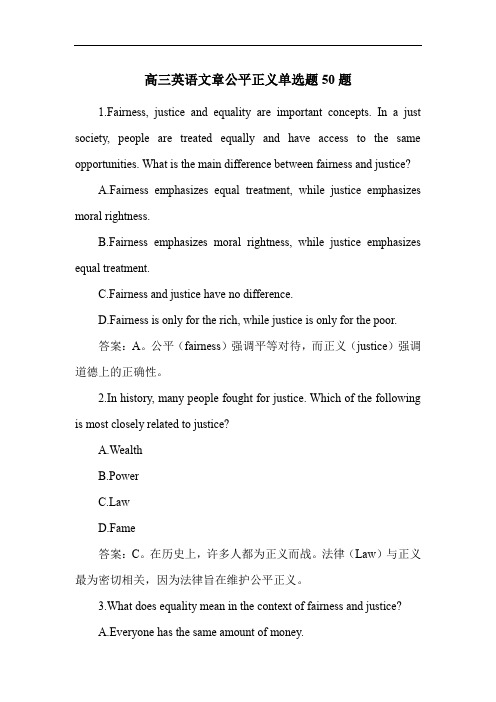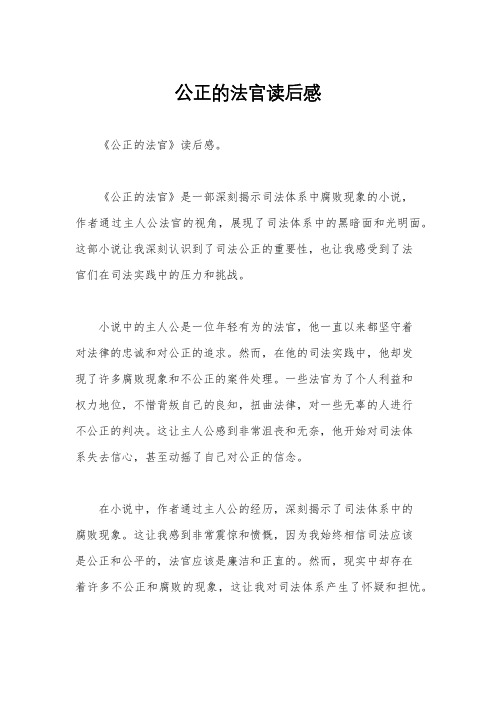a just judge 公正的法官
法律英语漫谈 似同实异的几个法律词汇

似同实异的几个法律词汇——法律英语漫谈五十五这几个形容词,由于在含义上似同而实异,很容易被混淆。
just作形容词时有三层含义。
一是指“公正的、公平的、正直的”行为或状态(fairorright;actingorbeinginaccordancewithwhatisnormallyrightandproper),如:ajust man(一个正直的人);ajustdecision(公平的判决);justindignation(义愤);justcompensation(公平的赔偿)等。
二是指“应得的或应该有的”(welldeserved;fairlyearned),如:ajustreward(应得的奖赏);ajustpunishment(应得的惩罚)等。
三是指“合理的、有根据的”(reasonableorbasedonreasonablegrounds),因此常译作“正义的”、“合法的”。
在这一层用法上,常与legal同义,如:justwar(正义的战争);justdebt (合法的债务);justtitle(合法权利);justauthority(合法授权);justcause (正当理由);justsuspicion(有充分理由的怀疑)等。
judicial是指“有关法官或法律的”(referringtoajudgeorthelaw),“审判上的或在法院所做的”(doneinacourtorbythejudge),因此,常译作“司法的”、“法官的”、“法庭的”、“审判上的”、“法院判决的”、“法官身份的”,如:judicialauthority(司法权;司法当局);judicialassistance(司法援助);judicialbody(司法机关);judicialcommittee(审判委员会);judicialact(诉讼行为);judicialapparatus(审判机关);judicialdiscretion(法官的自由裁量权);judiciallien(法律上的留置权);judicialpersonnel(司法人员);judicialprocedure(司法程序);judicialworld(司法界);judiciallimits(司法管辖范围);judicialprecedent(司法判例);judicialsettlement(司法解决);judicialseparation(经法院裁定的分居)等。
希腊神话人名-词根词缀

希腊神话人名-词根词缀Chaos 卡俄斯混沌之神最初的神,所有神的来源。
Chaos n.混乱,混沌注意发音(chaotic adj.混乱的)TITAN 十二泰坦神àtitanic 巨大的,强大的Gaea 盖亚大地女神(Chaos?Eros?Conus?)大地女神,子女满天下,传说数不清。
因此在很多地方,Gaea的神庙比Zeus还要兴盛。
词根geo 大地Geocentric adj.地心的(-ism n.地心说)Geopotential n.【物】重力势Georgic adj.农业的n.牧歌Geosphere n.【地】岩石圈Geotaxis n.【生】向地性(=geotropism)Geothermic adj.地热的garden 花园Geology地质侦查科terrain [地形(Terra 忒拉,古罗马神话里的大地女神,相当於希腊神话里的盖亚Gaia)terrestrial 陆地Eros 厄洛斯生命之神爱神(Chaos?Conus?…?)Eros的神权,主司生命和爱欲,是众多爱神之一。
因此也有说法,他是Aphrodite(阿芙罗狄忒,爱与美得女神)之子。
总之,希腊神祗们的关系比较混乱也是有目共睹的,重点是下面的词根。
词根eros (erot) 性,爱Erosion n.侵蚀(有时候爱确实会侵蚀人的精神。
erosive adj.)Erotic adj. 性欲的n.情诗,好色之徒(……以下略去N词,以防被和谐,有性趣的同学可以自己探究)Erotology n. XX艺术(既然是-ology就说明有人要研究,是吧?)erode侵蚀,腐蚀,使变化Atlas:希腊神话中Titans(泰坦)巨神之一,因背叛Zeus(宙斯)被罚在世界的西边尽头以双肩扛天。
Atlas从此有了地图、地图集、身负重担的人的含义。
Atlantic大西洋Oceanus 奥克阿诺斯海洋(Eros?)(Oceanid 奥西妮德海洋女神?)初代海洋之神,不知道后来怎么样了。
高三英语文章公平正义单选题50题

高三英语文章公平正义单选题50题1.Fairness, justice and equality are important concepts. In a just society, people are treated equally and have access to the same opportunities. What is the main difference between fairness and justice?A.Fairness emphasizes equal treatment, while justice emphasizes moral rightness.B.Fairness emphasizes moral rightness, while justice emphasizes equal treatment.C.Fairness and justice have no difference.D.Fairness is only for the rich, while justice is only for the poor.答案:A。
公平(fairness)强调平等对待,而正义(justice)强调道德上的正确性。
2.In history, many people fought for justice. Which of the following is most closely related to justice?A.WealthB.PowerwD.Fame答案:C。
在历史上,许多人都为正义而战。
法律(Law)与正义最为密切相关,因为法律旨在维护公平正义。
3.What does equality mean in the context of fairness and justice?A.Everyone has the same amount of money.B.Everyone has the same opportunities and rights.C.Everyone has the same job.D.Everyone has the same hobbies.答案:B。
公正的法官读后感

公正的法官读后感最近读了一本关于公正法官的书,这可真是让我感触颇深啊!书中描绘的这位法官,他在法庭上的每一次裁决,都像是在平衡着世间的天平。
他的公正无私,不偏不倚,让我对“公正”这个词有了更深的理解。
让我印象特别深刻的是书中描述的一个案件。
那是一起错综复杂的经济纠纷,涉及到两家大企业之间的合作破裂。
一方指责另一方违约,导致了巨大的经济损失;而另一方则坚称是由于不可预见的市场变化,才无法履行合同。
双方各执一词,证据纷繁复杂,就像一团乱麻。
这位公正的法官可没有被这混乱的局面吓倒。
他先是耐心地倾听双方的陈述,那专注的神情仿佛世界上只剩下这一个案子值得他关注。
他的眼神锐利而坚定,不放过任何一个细节。
在双方律师激烈辩论的时候,他时而微微点头,时而眉头紧皱,似乎在心里默默梳理着各种线索。
然后,法官开始仔细审查双方提交的证据。
那些厚厚的文件和复杂的数据,在他眼中仿佛不是枯燥的数字和文字,而是解开谜题的关键密码。
他一页一页地翻阅,不时在纸上做着笔记,那认真的样子,就好像在挖掘宝藏一般。
在庭审的过程中,有一位证人表现得非常紧张,说话都有些结结巴巴。
法官没有丝毫的不耐烦,反而用温和的语气鼓励证人慢慢说,不要着急。
他的声音沉稳而又充满力量,让人感到无比的安心。
最终,证人顺利地提供了关键的证词。
到了最后的裁决阶段,法官站在法庭中央,身姿挺拔。
他的声音清晰而响亮,每一个字都带着不可动摇的权威。
他详细地阐述了自己的判决理由,从法律条文的引用,到对事实的认定,再到对双方利益的平衡,每一个环节都说得明明白白。
当他宣布判决结果的时候,整个法庭都安静极了,仿佛连空气都凝固了。
而这个判决,让双方都心服口服,因为它是如此的公正,如此的无可挑剔。
读完这个部分,我不禁想到了我们生活中的种种场景。
在我们的日常里,也常常渴望着公正的存在。
比如说在学校里,老师对学生的评价和奖励是否公正;在工作中,领导对员工的考核和晋升是否公平;在社会上,各种政策和制度的实施是否能保障每个人的权益。
公正的法官读后感

公正的法官读后感《公正的法官》读后感。
《公正的法官》是一部深刻揭示司法体系中腐败现象的小说,作者通过主人公法官的视角,展现了司法体系中的黑暗面和光明面。
这部小说让我深刻认识到了司法公正的重要性,也让我感受到了法官们在司法实践中的压力和挑战。
小说中的主人公是一位年轻有为的法官,他一直以来都坚守着对法律的忠诚和对公正的追求。
然而,在他的司法实践中,他却发现了许多腐败现象和不公正的案件处理。
一些法官为了个人利益和权力地位,不惜背叛自己的良知,扭曲法律,对一些无辜的人进行不公正的判决。
这让主人公感到非常沮丧和无奈,他开始对司法体系失去信心,甚至动摇了自己对公正的信念。
在小说中,作者通过主人公的经历,深刻揭示了司法体系中的腐败现象。
这让我感到非常震惊和愤慨,因为我始终相信司法应该是公正和公平的,法官应该是廉洁和正直的。
然而,现实中却存在着许多不公正和腐败的现象,这让我对司法体系产生了怀疑和担忧。
与此同时,小说也展现了一些法官和律师对公正的追求和坚守。
他们在面对各种压力和诱惑时,依然坚守着自己的原则,秉持着对法律的忠诚和对公正的追求。
这让我感到非常敬佩和感动,因为在这个复杂的社会中,能够保持清白和正直非常不易,而这些人却做到了。
通过阅读《公正的法官》,我深刻认识到了司法公正的重要性。
司法公正不仅关乎个人的利益和权利,更关乎整个社会的公平和正义。
如果司法体系中存在腐败和不公正,那么整个社会都将陷入混乱和不安。
因此,我们每个人都应该为维护司法公正而努力,不仅法官和律师,每个公民都应该秉持正义和公平的原则,共同建设一个公正的社会。
在未来的道路上,我会更加关注司法公正的问题,积极参与到维护公正的行动中去。
我相信只有通过每个人的努力和奉献,才能够建设起一个公正和和谐的社会。
愿我们每个人都成为公正的法官,为社会的发展和进步贡献自己的力量。
Pisa阅读测试样题6公正的法官

Pisa阅读测试样题6 公正的法官■请阅读下列“公正的法官”的故事,然后回答问题。
公正的法官阿拉伯国王巴瓦卡斯常常听人说,在他治下的城市里有一位法官能够迅速地辨明是非,谁也不能够欺骗他。
国王很想知道这是不是真的,于是换上了商人的衣服,骑马前往这位法官居住的城市。
到了城门口,有个跛脚的乞丐走到国王面前,请求他的施舍。
国王给了他一些钱,准备继续前行,但乞丐仍拽住他的衣服不放手。
“你还想要什么?”国王问道,“我已经给了你钱啦!”“你给了我施舍,”乞丐回答,“但我还有个请求,请允许我与你一同骑马,把我送到城市广场,否则,马匹和骆驼可能会把我踏伤。
”于是,国王坐在乞丐的后面,用他的马把乞丐送到了广场。
他停下来,下了马,但乞丐却拒绝下来。
“我们已经到了广场,你为什么还不走呢?”国王问。
“为什么?”乞丐说,“这匹马是我的,你如果不肯还给我,我们一起去法庭打官司。
”听到争吵声,人们都围了过来,并且高声喊叫:“去找法官,让他来判决。
”国王只好与乞丐来到了法庭。
那儿还有其他的人也在找法官判案,法官将依次传唤他们。
在传唤国王和乞丐之前,法官正在处理学者和农夫争夺一个女人的案子,俩人都宣称这个女人是自己的妻子。
法官听完了他们的陈述,沉默了一会儿,然后说:“把女人留下,你们明天再来。
”他们走了后,一个屠夫和一位石油商人走到法官面前。
屠夫身上带有血迹,而石油商身上留着油痕。
屠夫手中抓着一把钱,而石油商则拽着屠夫的手不放。
“我向这个人买油,”屠夫说,“当我从钱包里取钱给他时,他用手抓住我,想把我的钱全部抢走。
这就是为什么我们找你打官司——你看,我抓着我的钱包,而他抓着我的手不放,但钱是我的,他是个小偷。
”石油商开口说话了。
“这不是真的,”他说,“这个屠夫找我买油,当我灌满了他的油壶后,他请我为他兑换一枚金币,我拿出钱放在椅子上,他却抢走了我的钱并企图逃跑。
正如您所见到的,我用手抓住他,并把他带到您这里来了。
”法官又沉默了一会儿,然后说:“留下你们的钱,明天再来。
judge和judice的区别

judge和judice的区别
在美国的司法系统中,judge表示低级法庭的法官,而justice 则表示最高法院的法官。
两种法官的某些职责有重合之处,而某些职责又是特殊的。
在大多数体制中,judge是指定的(appointed),指定人通常为该州的总检察长。
而justice则是选举(elected)出来的。
Judge多为法律学校毕业,并拥有律师从业经验,工作主要是根据事实和法律程序和此前判例对案件做出判决,包括有罪/无罪判决和服刑刑期等。
Justice 不负责法律讼诉(does not have responsibility over legal proceedings),故不需拥有法律学位或接受任何正式的法律培训。
当然,无论二者在司法系统中的职能是什么,judge和justice在每个社会中都重要非常。
justice的形容词

justice的形容词
Justice是一个名词,但是它也可以用作形容词,表示公正、公平、
合理的意思。
以下是Justice的形容词形式及其含义:1. Just:公正的,合理的,恰当的。
例如:a just decision(公正的决定)、a just punishment(恰当的惩罚)。
2. Fair:公平的,公正的,合理的。
例如:a fair trial(公正的审判)、a fair deal(公平的交易)。
3. Equitable:公正的,公平的,合理的。
例如:an equitable
distribution(公正的分配)、an equitable settlement(公平的解决
方案)。
4. Impartial:公正的,无偏见的,中立的。
例如:an
impartial judge(公正的法官)、an impartial decision(中立的决定)。
5. Objective:客观的,公正的,不带个人情感的。
例如:an objective assessment(客观的评估)、an objective viewpoint(客观
的观点)。
总之,Justice的形容词形式都与公正、公平、合理等概念有关,它们都是描述一个人、一个决定或一个行为是否符合道德、法律或社
会标准的词语。
- 1、下载文档前请自行甄别文档内容的完整性,平台不提供额外的编辑、内容补充、找答案等附加服务。
- 2、"仅部分预览"的文档,不可在线预览部分如存在完整性等问题,可反馈申请退款(可完整预览的文档不适用该条件!)。
- 3、如文档侵犯您的权益,请联系客服反馈,我们会尽快为您处理(人工客服工作时间:9:00-18:30)。
A JUST JUDGEby Lev Nikolayevich Tolstoy An Algerian king named Bauakas wanted to find out whether or not it was true, as he had been told, that in one of his cities lived a just judge who could instantly discern the truth, and from whom no rogue was ever able to conceal himself. Bauakas exchanged clothes with a merchant and went on horseback to the city where the judge lived.At the entrance to the city a cripple approached the king and begged alms of him. Bauakas gave him money and was about to continue on his way, but the cripple clung to his clothing.“What do you wish?” asked the king. “Haven‟t I given you money?”“Y ou gave me alms,” said the cripple, “now grant me one favour. Let me ride withyou as far as the city squar e, otherwise the horses and camels may trample me.”Bauakas sat the cripple behind him on the horse and took him as far as the city square. There he halted his horse, but the cripple refused to dismount.“We have arrived at the square, why don‟t you get off?” asked Bauakas.“Why should I?” the beggar replied. “This horse belongs to me. If you are unwillingto return it, we shall have to go to court.”Hearing their quarrel, people gathered around them shouting:“Go to the judge! He will decide between you!”Bauakas and the cripple went to the judge. There were others in court, and the judge called upon each one in turn. Before he came to Bauakas and the cripple he heard a scholar and a peasant. They had come to court over a woman: the peasant said she was his wife, and the scholar said she was his. The judge heard them both, remained silent for a moment, and then said:“Leave the woman here with me, and come back tomorrow.”When they had gone, a butcher and an oil merchant came before the judge. The butcher was covered with blood, and the oil merchant with oil. In his hand the butcher held some money, and the oil merchant held onto the butcher‟s hand.“I was buying oil from this man,” the butcher said, “and when I took out my purseto pay him, he seized me by the hand and tried to take all my money away from me. That is why we have come to you—I holding onto my purse, and he holding onto my hand. But the money is mine, and he is a thief.”The n the oil merchant spoke. “That is not true,” he said. “The butcher came to meto buy oil, and after I had poured him a full jug, he asked me to change a gold piece for him. When I took out my money and placed it on a bench, he seized it and tried to ru n off. I caught him by the hand, as you see, and brought him here to you.”The judge remained silent for a moment, then said: “Leave the money here with me, and come back tomorrow.”When his turn came, Bauakas told what had happened. The judge listened to him, and then asked the beggar to speak.“All that he said is untrue,” said the beggar. “He was sitting on the ground, and as Irode through the city he asked me to let him ride with me. I sat him on my horse and took him where he wanted to go. But when we got there he refused to get off and said that the horse was his, which is not true.”The judge thought for a moment, then said, “Leave the horse here with me, and come back tomorrow.”The following day many people gathered in court to hear the judge‟s decisions.First came the scholar and the peasant.“Take your wife,” the judge said to the scholar, “and the peasant shall be given fifty strokes of the lash.”The scholar took his wife, and the peasant was given his punishment.Then the judge called the butcher.“The money is yours,” he said to him. And pointing to the oil merchant he said: “Give him fifty strokes of the lash.”He next called Bauakas and the cripple.“Would you be able to recognise your horse among twenty others?” he askedBauakas.“I would,” he replied.“And you?” he asked the cripple.“I would,” said the cripple.“Come with me,” the judge said to Bauakas.They went to the stable. Bauakas instantly pointed out his horse among the twenty others. Then the judge called the cripple to the stable and told him to point out the horse. The cripple recognised the horse and pointed to it. The judge then returned to his seat.“Take the horse, it is yours,”he said to Bauakas. “Give the beggar fifty strokes of the lash.”When the judge left the court and went home, Bauakas followed him.“What do you want?” asked the judge. “Are you not satisfied with my decision?”“I am satisfied,” said Bauakas. “But I should like to learn how you knew that the woman was the wife of the scholar, that the money belonged to the butcher, and that the horse was mine and not the beggar‟s.”“This is how I knew about the woman: in the morning I sent for her an d said: …Please fill my inkwell.‟ She took the inkwell, washed it quickly and deftly, and filled itwith ink; therefore it was work she was accustomed to. If she had been the wife of the peasant she would not have known how to do it. This showed me that the scholar was telling the truth.“And this is how I knew about the money: I put it into a cup full of water, and in themorning I looked to see if any oil had risen to the surface. If the money had belonged to the oil merchant it would have been soiled by his oily hands. There was no oil on the water; therefore, the butcher was telling the truth.“It was more difficult to find out about the horse. The cripple recognised it among twenty others, even as you did. However, I did not take you both to the stable to see which of you knew the horse, but to see which of you the horse knew. When you approached it, it turned its head and stretched its neck toward you; but when the cripple touched it, it laid back its ears and lifted one hoof. Therefore I knew that youwere the horse‟s real master.”Then Bauakas said to the judge: “I am not a merchant, but King Bauakas, I came here in order to see if what is said of you is true. I see now that you are a wise judge. Ask whatever you wish of me, and you shall have it as reward.”“I need no reward,” replied the judge. “I am content that my king has praised me.”公正的法官列夫·托尔斯泰阿拉伯国王巴瓦卡斯常常听人说,在他治下的城市里有一位法官能够迅速地辨明是非,谁也不能够欺骗他。
